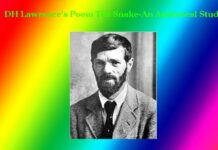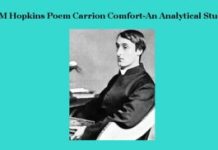John Donne’s Poetry | Chief Characteristics
Salient Features (Characteristics) of John Donne’s Poetry
John Donne’s Poetry | Chief Characteristics
John Donne (1572-1631) is one of the major poets of early seventieth-century England. With him, a new school of poetry began which is termed as ‘Metaphysical Poetry’. John Donne (the leader), George Herbert, Andrew Marvel, Henry Vaughan, and a few others belonged to this so-called Metaphysical school of poets. The main features which distinguish this so-called school of poetry from traditional poetry are that the poets of that school added ingenious and intellectual reasoning (arguments) to the conventional themes of love and religious poetry. Their arguments were highly fantastic, far-fetched and fanciful made up of hyperbolic simile, metaphor, oxymoron and so on which are called Metaphysical Conceits. The conceits were used, not for mere decoration, but to illustrate, elaborate or prove a point of view. John Donne’s poetry is the paragon of English Metaphysical poetry. The major poetic output of John Donne includes- The Songs and Sonnets, The Holy Sonnets, The Progress of The Soule, The Elegies and the Satires. The main features (characteristics) of his poetry may be discussed under two distinct headings as- thematic characteristics and stylistic characteristics. Thematically his poetry is characterized by the themes of love, religion and death. Stylistically his poetry is characterized by the use of conceits, wits, puns and Biblical and contemporary allusions and references, dramatic notes and compact words and phrases. Let us illustrate these features below:
First, the theme of love plays a dominant role in Donne’s poetry. His sense of love is ideological as well as realistic. His love begins in the flesh and dwells in the heart. His physical love sours up to heaven where it gets perfection and attains immortality. But he is free from the amorous description of his beloved’s beauty. His sense of love lies, not in physical charm, but on mutual attraction and trust. Donne has written a large number of poems on this theme among which the poems entitled -‘The Canonization’, The Anniversarie, The Flea, The Good Morrow, The Sun Rising, A Valediction: Forbiding Mourning are worth mentioning. In the poem entitled ‘The Anniversarie’ he says that everything of the universe is a subject of decay, and only true love is immortal. He writes:
”All other things to their destruction draw
Only our love hath no decay
This no tomorrow hath, nor yesterday.”
The poet is static in his love for his beloved and he is so deep in love with his beloved that wherever he looks, he sees the image of his beloved only. In the poem ‘Good Morrow’, he says:
”If ever any beauty I did see
………..it was but a dream of thee.”
In another poem entitled ‘The Sun Rising’, he expresses the same motto, as:
”She is all states, and all Princes I
Nothing else is.”
Secondly, the theme which fascinates his readers’ hearts and minds is the theme of religion. His poems dealing with the theme of religion is truly Christian. The very creed of Christism has been well-portrayed in his religious or devotional poems. Through his religious poems, he has expressed his genuine belief in the oneness of God who is highly great and merciful. He believes, like a true Christian, that Christ suffered the pangs of the Crucifixion on behalf of the redemption of mankind. Most of the sonnets given a place in his poetic book entitled ‘The Holy Sonnets’ are devotional. In one sonnet, he says:
”Teach me how to repent……..
As if thou hast sealed my pardon….”
Thirdly the theme of death is another thematic feature of Donne’s poetry. He has written some exquisite sonnets on the theme of death, among which mention may be made of ‘Death Be Not Proud’, ‘If Poysonous Minerals’, ‘Oh My Blacke Soule’ and so on. In these sonnets he has expressed his Christian view that death is inevitable, but death is not the end of life. It is a grace of God through which we enter heaven and thus get immortality. In some of his sonnets dealing with the theme of death, he also invokes ‘sickness’ which means sufferance and through sufferance, he hopes to get redemption. In the poem entitled ‘Oh My Blacke Soule’, he says:
‘Oh my Blacke Soule! now thou art summoned
By sicknesse, deaths herald and champion
Thou art like a pilgrim.’
In the poem entitled ‘Death Be Not Proud’, he expresses that death leads us to immortality, as:
‘One short sleep past, we wake eternally
And death shall be no more, Death thou shall die.’
Stylistically (technically), Donne’s poems are characterized by the use of conceits, wits, puns, references dramatic notes and compact words and phrases. Let us illustrate below:
First, which strikes our mind and excites our sense of wonder while going through his poems, is his imageries which are called conceits of the metaphysical order. His conceits are ingenious; drawn from a variety of sources as- theology, astrology, geography, law, medieval philosophy and contemporary sciences. His conceits are far-fetched, fantastic and fanciful which give testimony of his deep learning and cleverness. It is conceit through which he makes a unique and surprising blend of feeling, emotion and intellect. He is far away from using the conventional stock of conceits that are found in the Elizabethan poems. Unlike the Elizabethan, his conceits are not mere decoration, but an integral part of his poetry. His conceits are instruments as well as souls through which he illustrates, persuades and proves his point of view. In the poem ‘A valediction: Forbiding Mourning’ he uses the imagery of a compass to illustrate his static and heartily love to his beloved, as:
”Our two Soules, therefore which are one,
…………………………………………..
If they be two, they are two so
As stiff twin compasses are two.”
In the poem entitled ‘The Flies’, he invokes a striking conceit made of the metaphor of a flea which is highly fantastic and exciting, as:
”This flee is you and I, and this
Our marriage bed, and marriage temple is.”
Secondly, he has used ‘wits’ in his poem which does not excite our sense of wonder only, but also amuse us, as:
”If yet I have not, all thy love
Deare, I shall never have it all.”
In another poem entitled ‘Thou Hast Made Me’ he uses the wit, as:
‘And thou, like adamant draw my iron heart.’
Thirdly, he has created ‘pun’ with such words like: ‘sonne’, ‘shadows’, ‘will’ and so on.
Fourthly, his poetic style is characterized by dramatic notes. Many of his poems open abruptly, like a drama that imparts dramatic detachment though his poems are extremely subjective. For example, his poem entitled ‘The Canonization’ opens, as:
‘For Godsake hold your tongue and let me love
Or chide my palsie or my gout.’
The poem entitled ‘The Sun Rising’ he opens abruptly as a dramatic piece addressing to the sun, as:
”Busy old foole, unruly sun
Why dost thou thus
………..call on us.”
Fifthly, there is ample use of ‘allusion and references from medieval philosophy, the Bible and contemporary sciences. For example- ‘the seven sleepers’,’ St. Lucy’, ‘the constellation’,’ the earth being flat’; the imageries of ‘Christ’s Crucifixion and resurrection etc.
Sixthly, he uses both concrete and abstract words which sometimes render complexity and absurdity, though overall, his style is both smooth and rugged. Within the small space of his poem, he has brought in the ideas and images of life, soul, earth, heaven, death etc. The poem entitled ‘The Good Morrow’ may be taken as an example of his complexity as well as his delicate smoothness.
In conclusion, it can be said that John Donne is a metaphysical poet both in theme and style as- he has employed such metaphysical themes as love, death, God, heaven etc. and a style that is characteristically metaphysical such as – the use of ingenious conceits proving and leading his point of view to a logical conclusion and the blending of emotion and intellect. 0 0 0
John Donne’s Poetry | Chief Characteristics
Read More: Use of Myth and Symbolism in T S Eliot’s Waste Land
John Donne’s Poetry | Chief Characteristics
N. B. This article entitled ‘John Donne’s Poetry | Chief Characteristics’ originally belongs to the book ‘Critical Essays on English Poetry‘ by Menonim Menonimus. John Donne’s Poetry | Chief Characteristics
Books of Literary Criticism by M. Menonimus:
- World Short Story Criticism
- World Poetry Criticism
- World Drama Criticism
- World Novel Criticism
- World Essay Criticism
- Indian English Poetry Criticism
- Indian English Poets and Poetry Chief Features
- Emily Dickinson’s Poetry-A Thematic Study
- Walt Whitman’s Poetry-A Thematic Study
- Critical Essays on English Poetry
- Tawfiq al-Hakim’s Novel: Return of the Spirit-An Analytical Study
- Tawfiq al-Hakim’s Novel: ‘Yawmiyyat Naib Fil Arayaf’-An Analytical Study
- Analytical Studies of Some Arabic Short Stories
- A Brief History of Arabic Literature: Pre-Islamic Period …
Related Searches:
- John Donne as a Metaphysical Poet
- Characteristics of John Donne’s Poetry
- John Milton’s ‘Lycidas’ as a Pastoral Elegy
- Analysis of John Milton’s ‘Lycidas’
- Spenser’s Concept of Love in ‘Amoretti’
- Edmund Spenser’s ‘Amoretti’ Sonnets
- The Symbolism of ‘The Waste Land’
- The Blessed Damozel’ as a Pre-Raphaelite Poem
- Chaucer’s Art of Characterisation the Prologue to ‘Canterbury Tales











